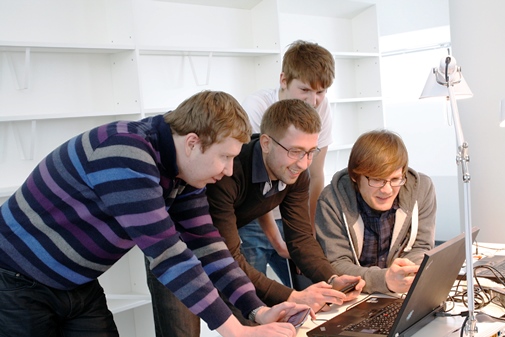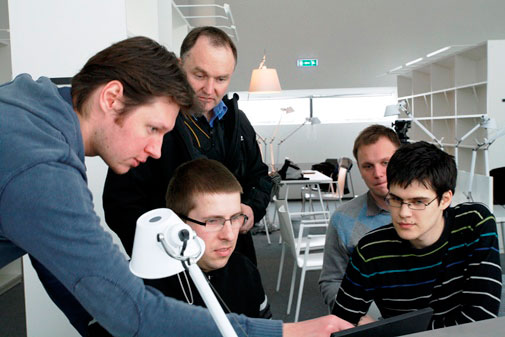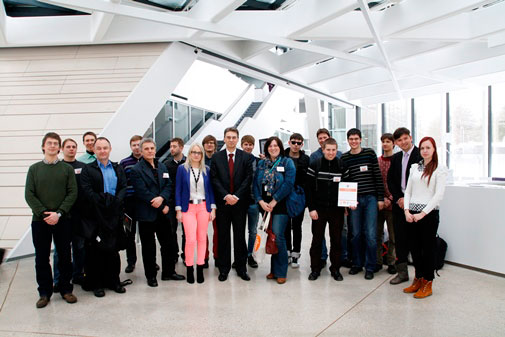Hack4LTL: first Cultural Heritage & Digital Humanities hackathon in Lithuania

By Ingrida Vosyliūtė, Coordinator of Hack4LT and Project Manager at Vilnius University Faculty of Communication.
Vilnius University Faculty of Communication and Vilnius University Library recently hosted the first cultural heritage and digital humanities hackathon in Lithuania - Hack4LT. The event was inspired by Lithuania's co-operation with both Europeana with its significant multilingual online collection of digitised cultural heritage, and DARIAH: Digital Research Infrastructure for Arts and Humanities, a major European digital humanities network.
The 2-day event took place in a recently opened National Open Access Scholarly Communication and Information Centre – the most modern library in the Baltic countries. It started symbolically on 4 April, also known as the day of St. Isidore of Seville, who is a declared patron of the internet, computers and computer users.

Hacking is fun! Photo - Darius Verseckas.
Hack4LT aimed to foster collaboration between scholars of digital humanities and software developers. The event encouraged technology-driven experimentation with existing Europeana datasets. Open access to this resource stimulates a broad public interest in European culture and challenges cultural institutions to seek new ways of engaging people and developing innovative tools. Because of the richness of Europeana's collections and the nature of preserved digital content, it is a valuable data source for digital humanities researchers and can enhance digitally-enabled research.
The hackathon brought together 20 young software developers, who were encouraged to try out their ideas for creative re-use of Europeana content in order to build applications showcasing the social and scholastic value of open cultural data. Two 500 EUR prizes were available for the best prototypes meeting the needs of digital humanities and the general public.

Dr E. Champion from DARIAH with the 'Manuscript' team, Digital Humanities category winners. Photo - Darius Verseckas.
The hackers formed small teams and worked on ideas they had discussed beforehand. Hacking ran till late in the evening with a few enthusiasts staying awake all night.
The 2 days of hacking resulted in 3 prototypes. After presentations of the results on the second day, the prototypes were judged by the jury of 7 experts.
The best prototype in the digital humanities category was ‘Crowdhwr’, developed by team ‘Manuscript’ (A. Gimbutas, J. Sadzevičius & M. Zimnickas). They created a crowdsourcing manuscript transcription system, tested using examples from Europeana. The prototype allows users to mark words in a digitised manuscript and prepare it for analysis. The winners were happy with the results and are planning to continue developing this prototype. Their goal is to create a tool allowing users to convert image to text in order to perform automatic search of a manuscript’s content.
The best prototype in the general public category was ‘Gamepad 2.0’, developed by team ‘CodeUnited’ (S. Mikalonis, K. Rutkauskas, M. Sorokin & M. Ūba). The team created a fun, educational quiz game, which uses Europeana data to generate questions, concerning various aspects of Lithuanian history, art and culture. The quiz encourages players to compete with each other by giving answers in a limited amount of time.

'CodeUnited' team, the winners in the General Public category. Photo - Darius Verseckas.
A consolation prize was also given to the third prototype developed by I. Bačius, M. Baranauskas, J. Jaronis & I. Pliavgo. They created a Europeana plugin, which can be set up in databases and web portals that use the Django framework. While using an existing search of digital objects, the plugin links the search with Europeana's data and shows similar results found on the Europeana portal.

Hack4LT participants with the rector of Vilnius University, prof. habil. dr. J. Banys (centre). Photo - Darius Verseckas.
The rector of Vilnius University, prof. habil. dr. J. Banys, congratulated the participants of Hack4LT saying: ‘You are a revolutionary part of our society, having so many great and fresh ideas. I am glad that these ideas matter. Moreover I hope there will be more of them in the future.’
